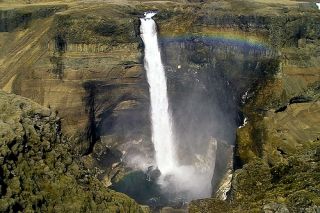By Snorri Páll Jónsson Úlfhildarson, originally published in Morgunblaðið – After last autumn’s economical collapse, the discussion about environmental issues changed rapidly. Politicians who before spoke with full force against further energy- and heavy industry projects have now completely turned around, with the premises that environmentalism is prosperity politics. The head of the Left Green party recently called the party’s environmental policy puritanical and said that it does not apply in times of economical depression. The last fortress must then be fallen – at least amongst those who believe in reforms inside the representative democracy.
Now the plan is to push through an aluminium smelter in Helguvík with all its appropriate energy construction. Svandís Svavarsdóttir, the minister of environment, recently said that there is not enough energy on the Reykjanes penisula to fulfill the smelter’s energy needs. Others have pointed out that harnessing the geothermal areas there will be such a massive attack that the areas will most likely dry up in a short time. Katrín Júlíusdóttir, the minister of industry, has stated her positive opinion about Landsvirkjun producing energy for Helguvík – and the Þjórsá river comes immadeatly up to one’s mind. She also seems to be willing to renew the memorandum of understanding between the government and Alcoa, which according to the latter’s plans means that the whole geothermal areas in north-east Iceland have to be harnessed and dams built in one or more glacial rivers.
Recent studies about the economical impacts of heavy industry and the beneftits of energy realization to aluminium smelters, give the ideas that all the propaganda about the benefits of the Kárahnjúkar Dam were built on nothing. In a report about the economical impacts of heavy industry, economist Indriði H. Þorláksson says: “The country’s primary benefits of the operations of heavy industry plants owned by foreign parties, are the taxes they pay. It is supposed that the tax payments of an avarage aluminium smelter is around 1,2 billion ISK per year. That is only about 0,1% of the national production.” And a new report made by four economists by the request of the minister of finance, says that the selling of energy to heavy industry is simply not economically beneficial.
Other results – e.g. if the energy selling actually was beneficial – would most likely not impact most environmentalist’s opinions. But these results actuate the pleading of those who have claimed that the government and corporations connected to the heavy industrialization of Iceland are simply lying to people about the economical benefits of the constructions. It really should not have surprised anybody; the title of the Minsitry of Industry’s sale brochure, Lowest Energy Prices, says everything that has to be said about the realization of energy to heavy industry here in Iceland.
Further aluminium smelter construction in Iceland is an experiment to maintain life in an unsustainable economic system, which is based on the idea of constant production. Production that insists that raw materials like bauxite – aluminium’s main material – is constantly mined, transported from one continent to another, processed in many energy consuming steps until in the end, it becomes a product, ready for consumption.
Many of the aluminium adherents in Iceland have restorted to the theory of demand and supply, as an argument for continued and increased aluminium production: while people still buy aluminium, it has to be produced. The theory fits completely to the consumer society we live in, but its premise is that the demand is real and natural, but not made up. The consumer society is built on made-up “needs”, which people are taught to ask for. Capitalism’s constant production and the paralell aggressiveness towards the earth, would not add up if it would not be for these false needs. Therefor, it is absoloutly inevitable that environmentalists’ idealolgy bases on opposition to capitalism’s over-production and over-consumption.
The critique on aluminium production here in Iceland has unforunately often been built on a very shallow ideology. Instead of looking at the aluminium industry as only one part of the extra-ordinary complicated web of global capitalism – and one of its bases – it has been seen as a single phenomenon, which has to be replaced by something else. Words like “green industry” have therefor become leading in the mainstream environmenatlist discussion. But there exists a different critical way of looking at heavy industry and ecological destruction in general.
A critique on heavy industry, based on deep ecological thought, does not need to include any ideas about what comes instead of aluminium if this “instead” means a different kind of industry or other destructive operations. Instead there simply is unspoiled nature, which is enormously necessary for the planet we live on – not from a beauty perspective, but because of the fact that the nature is the premise of life. Deep ecology bases on the idea that the man is not more superior than the ecosystem’s other forms of life, but is rather only a part of the ecosystem and has therefor no rights to deplete it, expect in a completely sustainable way. Sustainability is a difficult consept, which governments and corporations have managed to steal and put into their rhetoric, and therefor been able to sustain lies and hoaxes about the real meaning of it. The fundamental idea of sustainability is that we return to the natural world as much as we take from it.
Protecting the nature, for nature’s sake has thus nothing to do with the economical situation. Claiming that radical ecological ideologies only fit in when enough money exists is a complete absurdity. It is not like the last years of “prosperity” here in Iceland were marked by very ecologically friendly ideas.
